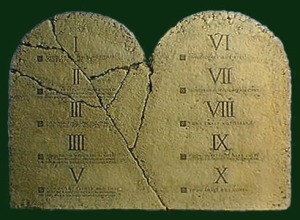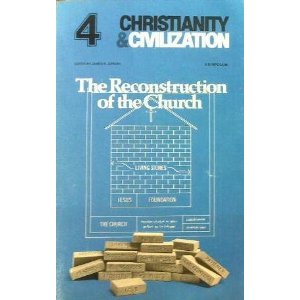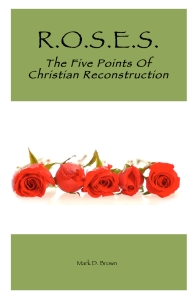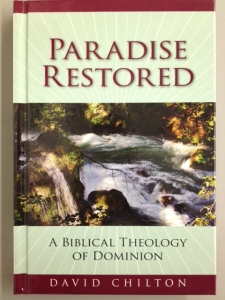
If you pull out a copy of R. J. Rushdoony’s seminal work, The Institutes of Biblical Law (vol. 1, especially)–that path-breaking, paradigm-shifting, pietism-slaying, antinomianism-busting book which essentially launched the Christian Reconstruction movement into orbit in 1973–and set it in front of your average evangelical, or even Reformed, Bible-believing Christian today, you’re liable to get one of two reactions: (1), “What do I care about ‘biblical law?’ After all, we’re under grace not law!“, or, (2), “Aaagggghhhh! Away with that heretical book! Take it out of my theologically-prejudiced, Jesus-will-be-here-any-minute-now-so-don’t-confuse-me-with-new-biblical-data-that-I-don’t-agree-with presence. My pastor warned me about THOSE PEOPLE!”
I’m sure he did.
And that’s the problem.
Theonomy, optimistic, postmillennial eschatology and a Christian’s responsibility to apply his faith (comprised authoritatively in both the Old and New Testaments) in EVERY area of life–including politics and culture–are, even now, “foreign” concepts in many Christian circles. And even though they continue to gain a hearing in some churches and a following among more biblically and historically enlightened Christians, these and other ideas and concepts garnered from the vast mother lode of Christian Reconstructionist resources are still among the undesirable “stones” that are routinely rejected by the “builders” of Christ’s kingdom since the last century.
This is from Martin G. Selbrede at Chalcedon Foundation. It is the feature article in the Jan./Feb. edition of their official publication, Faith for All of Life. He discusses the impact that Rushdoony’s Institutes and its teachings on biblical law have had over the years and are having in certain churches and among certain Christians, and why it is having that impact.
Get into a comfortable chair, maybe get a little something hot to drink, and savor what Martin–that is, Mr. Selbrede–has to share with you.
You’re going to like this!
———————————————
Another Rejected Stone
By Martin G. Selbrede
Men invariably find themselves on the wrong side of the great reversals wrought by God. The things men regard highly, He esteems lightly. He uses the simple to confound the wise, and the weak to overcome the strong. The stone the builders reject becomes the chief cornerstone (Ps. 118:22, Matt. 21:42, Mark 12:10, Luke 20:17). While this particular scripture involves the rejection of the Messiah, it nonetheless establishes a general mode of behavior that Christians seem dead set on repeating. Christian leaders building the edifice of evangelical Christianity for the last half-century have been quick to refuse many stones they’ve deemed to be unsuitable building materials for God’s Kingdom.
For good reason did the translators of the King James Version select the term refuse to express the builders’ attitude to the stone that God intends for “the head stone of the corner” in Psalm 118:22. God’s people treated the Lawgiver the same way they treated His laws. Our contemporary misconceptions concerning His law are legion, so much so that when God asks “How long refuse ye to keep my commandments and my laws,” we are certain this was uttered some time after the law was delivered on Sinai. But it was not. God asks this in Exodus 16:28, months prior to the “official” delivery of the law (“official” as determined by the reigning builders leading our churches and seminaries).1
Small wonder that in an age when the great things of God’s law are esteemed a strange thing (Hosea 8:12) we end up traveling across the country with an unsettling message to our fellow Christians: everything you know about the law of God is wrong.
If God’s law has fallen on tough times in our antinomian age, it should be no surprise to find that proponents of God’s law are refused by the builders as well. When R. J. Rushdoony wrote The Institutes of Biblical Law, the book quickly joined the ranks of refused stones. In affirming this, we’re not ascribing canonical status to this imperfect work by an imperfect man, nor equating his book with Scripture, nor identifying its author with the Author above all authors. Nonetheless, the importance of this particular work can hardly be overstated.
The cynics among the builders will be quick to impugn our motives here as self-serving: “You’re promoting that book because you publish it!” No, we don’t publish it. It is published by Presbyterian & Reformed. We draw attention to it because it benefits the Kingdom of God to do so, not because it benefits us financially. Our goal is to expand the reader’s awareness of the significance of this book. In a cynical age, this will be an uphill battle, one made more difficult in the face of resistance mounted by today’s builders.
Rushdoony’s Unforgivable Sins
Why does Rushdoony’s Institutes elicit such hostility among the builders? After all, books about the Ten Commandments have been fairly common in Christendom. At the dawn of the Reformation, John Wycliffe expended considerable ink on the government of God and the Ten Commandments in one of his most important works, his Summa Theologiae (not to be confused with the Summa of Thomas Aquinas). The heirs of the Reformation, the Puritans, likewise regarded the law of God as an issue that needed to be engaged, not neglected or ignored. The fact that God’s law was generally held in high esteem at the high point of Biblical scholarship in the Western world should not be missed. In contrast, today’s quick-and-dirty, sloganized dismissal of the law of God is worse than embarrassing: it has utterly neutered the people of God.
Modern evangelical Christianity has veered off its moorings into the plush comfort of vague generalities. Today’s builders have yet to meet a spiritual cliché they won’t embrace with enthusiasm. Perhaps those of us influenced by the Puritans have been marginally less than gracious when ascribing “warm, fuzzy, pious gush and mush,” to modern ChurchSpeak, with its unbalanced elevation of feelings over all other considerations. If this dominant mindset hadn’t mired so many Christians in a potentially fatal immobility, patience would have been easier to exercise.
The appeal of generalities is that they don’t touch us directly, they mediate information by way of abstraction, and abstraction is always a step or more removed from concrete reality. Speaking in generalities permits us to be oblique. When we generalize the Word of God, we dull its sharp edge. The Word of God becomes a two-sided pillow2 rather than a two-edged sword.
This was the first of Rushdoony’s sins: he was specific. He didn’t spiritualize the Decalogue with high-sounding rhetoric that would actually make void the law of God (Ps. 119:126) or render the commandment of none effect (Matt. 15:6). Recognizing that all of the law and the prophets hang on the two great commandments, Rushdoony mined from God’s own commentaries on His law. God was specific, so Rushdoony’s exposition followed suit.
This was entirely unacceptable.
Although the builders may concede that the law of God is good if used lawfully (1 Tim. 1:8), that the law is perfect, just, holy, spiritual, and to be delighted in with the inner man (Rom. 7:12, 14, 22), the law must always be presented as a vague generality, an inaccessible goal, or (better yet) both. When presented in this way (stripped of specifics), the builders believe they’ve realized the ideal of the spirit (a general ethos) that gives life rather than the letter (God’s statutes) that kills. They’d surely deny that they’ve added or taken away from the law: they’ve simply generalized it. (When pharmacists invented Bufferin to make aspirin easier on the stomach, the notion was valid. Had Bufferin been invented by evangelicals, there’d be no aspirin in it-just buffers to soothe the stomach.)
Books about the Ten Commandments that deal in generalities, that play it vague, that rearrange our Christian clichés and slogans with eloquence, don’t elicit hostility. They’re welcomed because they buffer us from God and the power of His Word.
This was a game that Dr. Rushdoony had seen played out too many times, to ruinous results (especially as a missionary at Owyhee). Muzzling the Word of God was an exacerbation, not the solution, to man’s burgeoning problems. The New Covenant, among other crucial things for Christians, did indeed involve the writing of God’s laws on our hearts and mindsin specifics, inculcating the same spirit motivating David’s composition of Psalm 119. The first Psalm was to be taken as written (it extolled the law of God), not as hijacked by the builders (who point to anything but the law of God as the thing to meditate upon day and night).
In other words, one of the stones already rejected by today’s builders is Psalm One’s reference to the “law of God.” That ugly stone has since been replaced by a much better brick, one hewn by the hand of man, leading the reader away from specifics and back into the evangelical fog.
The Puritans were not crippled by such “improved readings” of the Psalms. We today are not merely crippled; we’re in a body cast and on life support. We ourselves are the emperors without any clothes.
Then along comes Rushdoony.
Rushdoony: the one who waxed specific about the law. The one who treated the specifics as if God had actually written them. By talking about specifics as if they mattered (and they do), he did something dangerous to the generalizations. He swept them, all of them, aside as thinly veiled attempts to repackage human autonomy within the contours of Christian spiritual terminology.
Rushdoony did this two ways. First, he painstakingly documented the consequences of neglecting the specifics of God’s law. Second, he did the same for the consequences of “observing His commandments, to do them” (Psalm 103:18). Most observers expected a Christian writer to speak to the first point, but not so much to the second. But by dealing with the law’s specifics across all domains of human action (cultural, economic, sociological, environmental, scientific), Rushdoony opened up new avenues for seeing the folly of mankind and the wisdom of God. He was unmuzzling the whole counsel of God. And the builders found this to be unacceptable. They preferred to repose true value in God speaking through His Spirit to individual souls, not in His speaking to us through His law. Not merely to assert value, but moral obligation and a ground of blessing, of the law of God (like the Scriptures, in their irksome way, sometimes seemed to do) was beyond the dimensions of our modern cramped orthodoxies.
It is somewhat remarkable that the concept of orthodoxy can even survive in the context of vague outlines and fuzzy generalizations, but that haze is strenuously guarded not for its own sake, but for what hides behind it. The man in Matt. 5:19 who loosens even the least commandments of God and teaches men so is deemed “the least in the kingdom of heaven.” By blowing away the fog, the sharp outlines of the antinomian’s razor is revealed in stark contrast against the background of Scripture.
But there was more. The loosening of God’s commandments creates an ethical vacuum that is always filled by something else. In fact, creating new rules of conduct for Christians is itself one way that God’s laws are loosened, not only individually but in the aggregate. Why? Because such attempts at lawmaking undercut the sufficiency of Scripture. The man of God is assuredly not “thoroughly equipped for every good work” with the Old Testament, no matter what 2 Tim. 3:17 reads: men must amend God’s law, peel some of its unacceptable or unworkable parts away, and using our vague general spirituality as a guide, build a more workable set of rules for Christian conduct for our modern era.
Over the course of its 800-odd pages, Rushdoony’s Institutes gives the lie to that misguided Christian conceit. For faithfully recounting the wonderful things in God’s law, the book’s author was labeled a dangerous extremist (that’s when the builders were being nice). In fact, the builders found themselves in agreement with the enemies of Christianity in their assessment of Rushdoony. This is strange company to be in … or is it? Perhaps their joint commitment to human autonomy (overtly so among the humanists, covertly so among far too many Christians) led these two groups to sing in harmony this one time … against the evils and horrors supposedly riddling God’s law.
The Dislocation of Liberty
Beyond the sin of magnifying all the commandments of God (that is, the sin of dealing with specifics, the fleshing out of God’s moral imperatives for man), Rushdoony revealed something else about the law’s detractors. These men invariably pose as champions of liberty, but God’s law maximizes human liberty while rejection of it puts us under the oppressive power of our fellow man. Isaiah 5:20 refers to those who call good evil and evil good, and this moral reversal is routinely played out over against the debate concerning the place of God’s law in our world.
When observing Rushdoony’s achievement in documenting the truth of the Psalmist’s assertion that he walked at liberty because he sought God’s precepts (Ps. 119:45), the builders are quick to contradict the Scripture: pay no attention to the man behind the curtain! Avoid the bondage of God’s law. Enter into the freedom that comes when those ugly specifics of God’s law are set aside.
But just as Psalm 119:45 cannot be broken, neither can Psalm 94:20: the wicked frame mischief using law. When the law is slacked (Hab. 1:4), something else takes up that slack: the precepts of men. Men abhor moral vacuums, and if God isn’t Lord over the matter addressed by one of His statutes or precepts, then man slips his feet into God’s shoes to legislate in His stead.
Some builders might tolerate the restrictions that God’s law might impose on the secular state, but no builders will tolerate the restrictions that God’s law would place on the church’s most sacred activity: making rules for the congregants to walk by. Ultimately, the implicit defense of autonomy that drives the antipathy toward God’s law merely masks an aggregation of power by human authorities in both church and state. The law of God cuts across all these boundaries to liberate men from lawless overreaching by all human institutions. Since these institutions put on airs as the defenders of liberty (rather than its enemies, as is regrettably the case), they must either repent or characterize Rushdoony’s position as insane (as some have, for all intents and purposes, already done).
Is it not revealing that we have as hard a time finding an elected official who’ll actually follow the U.S. Constitution (setting aside the debate over its Biblical status) as we do a church leader who’ll follow the entire Bible (which, unlike the U.S. Constitution, is actually perfect)? In both cases, men seek to cast various cords from them and burst various bonds asunder (Psalm 2:3), no matter how glowingly they paint such rebellions as liberating acts.
Today’s builders, then, know full well that God’s law encroaches on their power, their authority, their autonomy, their spiritual sinecures, and their plans for the future. They know this as well as the secularists know it-perhaps even more so. If they were not wedded to these “benefits” of antinomianism, they would bend the knee and acknowledge the glory of God’s perfect law of liberty. Instead, they go away very sad, for their possession of legislative power in their spiritual communities is very great and they’re unwilling to put that at risk by unleashing liberty among their flocks as God would have them bestow it in their capacity as His mouthpieces.
If liberty is a dangerous thing, perhaps few should have the actual article, and the rest should merely be convinced into thinking they have it. Nothing achieves this goal better than the vague fog of ChurchSpeak, which has taken turns into Orwellian paths that would have been unthinkable a century ago. When the law of God is magnified, men can clearly recognize whether they’re abiding under their own vine and fig tree or not, and illusions become impossible to maintain. In a world sustained on empty illusions, a world that effectively “loves death” (Prov. 8:36), the gatekeepers have spoken appropriate words of comfort: “peace, peace” (Jer. 6:14; 8:11)-but they heal the wound of His people slightly.
The Sin of Contemporary Relevance
God makes clear to His people that His words are not distant and inaccessible but “nigh, even in thy mouths” (Deut. 30:11-14). But too many of our builders today will argue that while God’s laws may not be distant in terms of miles, it isdistant from us in terms of years. If it was delivered thousands of years ago, it was in a form that must only be useful to ancient agrarian societies-not to us.
The builders then assure us that this is their motive for retreating into the haze of vagueness: by so doing, they can glean some spiritual meaning for us today, thus preserving God’s law to us in the only form that we could possibly find benefit in. They find life for an old worn-out shoe by putting a new soul [sic] on it. Their paperback books glory in the hidden treasures of the old shoe (without ever denying, let alone challenging, the “fact” that it’s an old shoe). The builders are then back in the driver’s seat, now becoming the champions of restoring the contemporary meaning of God’s law (as they’ve discerned it) by teaching it in abstraction.
Rushdoony challenges this line of reasoning, arguing from Scripture that the law of God is timeless and speaks to all men in all societies across all temporal boundaries. His powerful exposition of the details of God’s laws so thoroughly establishes their contemporary relevance that it sounds the death knell for those who hold the opposing view (that God’s law is a quaint artifact that long ago retired as the Word of God Emeritus). It is here that Rushdoony’s encyclopedic knowledge comes to the fore, sweeping forward and backward in time with example after example illustrating the wisdom and perpetual applicability of God’s precepts.
Most builders wouldn’t have taken offense if Rushdoony had restricted himself to delineating the value of God’s law during its supposed earthly run (from Moses to Christ as many poorly-guided Christians currently hold it). Rushdoony does no such thing. He shows that Christians who embrace their calling to “establish the law” (Romans 3:31) have an unlimited runway in front of them. By opening the doors to possibilities the faithful had lost sight of after the Puritan era ended, the work of Rushdoony and like-minded Biblical scholars before and after him has set in motion something extraordinary: Christians who have finally taken up the proper armor to fight in, and the proper tools to build with. If the Word of God has contemporary relevance, and we’ve neglected to apply it, then the crying need of our era is to fulfill the Great Commission in its fullness while taking every thought captive to the obedience of Christ (2 Cor. 10:4-5). Men and women influenced by Institutes and by preaching based on the whole counsel of God know for a fact that the Word of God is sufficient. The liberating power of that one point can change the entire world.
Then, the only task remaining is to extend the reach of God’s law, extending the realm of liberty and holiness and Christ’s lordship over all things in the process. This follows from the fact that there is no neutrality in God’s world (despite what the peddlers of piously fuzzy theology might argue). The Bible asserts that “even the plowing of the wicked is sin” (Prov. 21:4), so that men are to work toward an ever-broadening application of God’s law as implied in Psalm 119:96: “I have seen an end to all perfection, but thy commandment is exceeding broad.”
In short, if the law is merely for ancient agrarian cultures, we have to dig deep to find something of value in it for us andour world. But if, as Rushdoony shows, the law is addressed directly to us and our world, and our crises are a direct result of our studied neglect of the Scriptures, then we are actually equipped with the tools God has given us to establish His kingship over our persons and our families … and then beyond.
These are tools that the builders do not believe you should take up or use. They are not for you, they say. These are tools with no contemporary purpose. Stick with the current program, or hunker down, but in any case, do not build anything-especially without our sanction, and especially not with stones we’ve rejected.
But these are tools that Rousas John Rushdoony put directly into your hands, going around the builders entirely. It is yours to decide whether to slacken your grip and drop them into a dustbin, or to wield them like a man.
Rushdoony’s Final Sin
Perchance the builders of modern evangelical Christianity could have forgiven Rushdoony for being specific instead of protecting the status quo ethical haze that hangs like gauze before the eyes of God’s people. They might have been able to overlook his proclamation of liberty from man’s better-reasoned substitutes for God’s laws in both church and state. They might even have been convinced to wink at the vibrant call to action implicit in Rushdoony’s treatment of God’s Word as a timeless revelation rather than a historically-conditioned temporary ethic for ancient Israel that God terminated after sixteen centuries (which He might reinstitute for yet another ten centuries as held by premillennial believers but which most definitely is not for us today). All of that might have been forgiven.
But R. J. Rushdoony won’t be forgiven by these builders.
If you read The Institutes of Biblical Law, you will quickly realize why this is so.
This book is so unremittingly Biblical, upholding such a high regard for God’s enscriptured Word, and then carrying the light of that Word in all its manifold details into every imaginable area, it comes across as a virtual roadmap for applying our faith in ways that are utterly concrete and ripe with meaning.
Rushdoony illustrates how God has actually positioned the true moral axis of the world: not upon moralism, but upon godliness. These two things, moralism and godliness, are not the same thing, as Rushdoony repeatedly proves, again contradicting the builders’ all-too-humanistic vision of morality and Scripture. But how many Christians know this? How many Christians continue to orbit the wrong moral axis, the one still commended by our builders?
Even less forgivable to the builders is the fact that Rushdoony’s book is absolutely formidable in stretching the scope of the Ten Commandments back out to their original total dimensions, thereby revealing the tragic fact that the Word of God has been shriveling and contracting under our watch as we’ve “limited the Holy One of Israel” (Ps. 78:41) under the urging of our builders. Rushdoony’s Institutes reverses the incredible shrinking Bible effect, and comes little (if anything) short of fomenting an explosion of the applied Word of God across all Creation. Every paragraph of this book has the net effect of retaking lost ground. There are few things that can motivate a dedicated Christian more than working to increasing his King’s holdings in the world, starting with himself and his own family.
But there is one thing that is an even greater motivation.
For the final sin of Rushdoony is how he turns the tables on all the builders who vaunt love as the great Christian value. Far from being what his enemies depict him as (an ungracious, unloving legalist), anyone reading Institutes in one hand and the Bible in the other will soon realize that it is Rousas John Rushdoony, not our evangelical leaders, who is the truetheologian of the heart. The careful reader will soon realize that Rushdoony is propounding nothing new, he’s calling for a return to a lost faithfulness on the part of God’s people and pointing the way.
There is no stumbling in the darkness when the statutes of God line the path you walk upon. That is the “highway of holiness” that is so easy to see under the light of God’s law that “wayfaring men, though fools, will not err therein” (Isa. 35:8). In modern language, we’d say that Isaiah is setting forth The Idiot’s Guide to Holiness by using such pointed terms: anybody can understand it, and everybody will know how to walk there. “The redeemed shall walk there,” Isaiah informs us (Isa. 35:9).
For the truth of the matter is that Rushdoony’s Institutes cannot help but prick hearts. It edifies, but it also indicts, for the Word of God always has two edges, and it is probes deeply into “the thoughts and intents of the heart” (Heb. 4:12). Moreover, the greatest commandment could not be more clear: we are to love the Lord God with all our heart. If all the law and the prophets hang on this command and its companion verse in Leviticus 19:18 to love our neighbor, theneverything in Rushdoony’s book is directed to how we love God with all our heart. To do this one ultimate thing, while still addressing every other culture-transforming aspect of the book disclosed above, ranks as the most valuable gift any Christian can give to another.
Releasing such a comprehensive, many-faceted love upon our families, churches, and culture, if pursued with the same heart with which David wrote Psalm 119, will quickly show how comparatively anemic our contemporary builders’ notion of love in all its vagueness really is. The specifics of God’s laws embody true love, toward God, toward man, and even toward creation itself, as Rushdoony ably documents.
The more ministries and churches and families incorporate Institutes as a source of exposition, of edification, of guidance, the more they find themselves building on the rock of God’s total word to man, and the less intimidated they become in handling the whole counsel of God in our modern world. The modern builders’ agenda of keeping their fog machine stoked, of refusing the stone of God’s law and any books that unleash it among God’s people, will always appeal to escapists, to antinomians, to those content with false liberty, and any who prefer emotional intoxication over a heart bent on fully serving God and man.
If you can’t see that our builders have already led us into an incredibly deep ditch,3 you will not recognize that Rushdoony is leading you to maturity, liberty, truth, and a faith that overcomes the world.
But once you read the Institutes, you’ll never again see the Ten Commandments as a tired Christian cliché filling dull Sunday school lessons for children. You will know that God’s Ten Commandments anchor nothing less than a siege engine that will level every shakable thing and lay them all in the dust so that the unshakable Kingdom alone will remain. And you and your family will act on that certainty with invincible resolve, total conviction, utter humility, and with every single atom of your being.
1. The strident, tendentious efforts to explain away God’s references to His statutes, laws, and commandments in Genesis 26:5 and Exodus 18:16 (and everything in-between) are likewise heavy with the fingerprints of today’s “builders.”
2. The Monty Python skit concerning the Spanish Inquisition mirrors our modern approach quite effectively, insofar as the most dreaded weapon the fictional authorities use against their targets is “the comfy cushion.”
3. As has been well said, the culture is the report card for the church.
Martin G. Selbrede is Chalcedon’s resident scholar and Editor of Faith for All of Life and the Chalcedon Report.
Reprinted by permission from the author.
To subscribe and read all of the articles and resources found at Chalcedon’s website and in their publication,
Faith for All of Life, click
here.

 As I have previously written, Chllton’s legacy is one of an energetic and eminently intelligent biblical expositor and pastor who had a rare gift for taking profound and sometimes controversial theological themes and making them vivid and powerful and at the same time understandable and quite simple to grasp. He spoke and wrote conversationally with sincerity and clarity rather than academic or rhetorical obscurity.
As I have previously written, Chllton’s legacy is one of an energetic and eminently intelligent biblical expositor and pastor who had a rare gift for taking profound and sometimes controversial theological themes and making them vivid and powerful and at the same time understandable and quite simple to grasp. He spoke and wrote conversationally with sincerity and clarity rather than academic or rhetorical obscurity.






